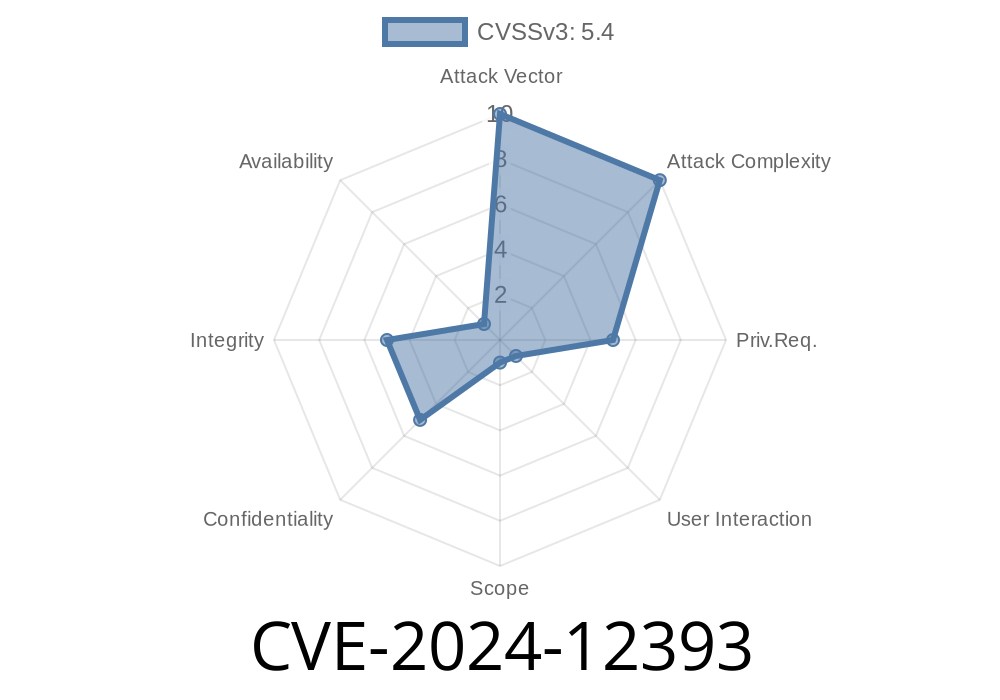Drupal is one of the most popular open-source content management systems (CMS) used to run millions of websites. As with any widely used platform, Drupal is a regular target for security researchers and, unfortunately, for bad actors as well. In early 2024, a new serious vulnerability (CVE-2024-12393) affecting Drupal Core was discovered, opening the door to one of the web’s most common and dangerous threats: Cross-Site Scripting (XSS).
This post will walk you through what CVE-2024-12393 is, how it works, who it affects, how it can be exploited, and most importantly—how to fix it. We’ll use simple language and plenty of actionable details, plus code snippets and references.
What is CVE-2024-12393?
CVE-2024-12393 is a security flaw classified as “Improper Neutralization of Input During Web Page Generation,” more commonly known as a Cross-Site Scripting (XSS) vulnerability. This type of bug means user-supplied content isn't properly cleaned (sanitized) before being displayed on a web page, allowing attackers to inject malicious JavaScript code that runs in the browser of anyone viewing the page.
In Simple Terms
If your Drupal website falls under the affected versions, an attacker can sneak in harmful scripts—maybe through a form field or a comment section. When another user visits the page, those scripts can do things like steal login cookies, redirect them to malicious sites, or even take over admin accounts.
11.. before 11..8
If your Drupal website is running any version before the patch releases above, it’s at risk. See your version by running:
drush status
or by checking the “Status report” page at /admin/reports/status.
How Does the XSS Vulnerability Work?
Without proper filtering, unsanitized user input gets rendered as HTML/JavaScript on web pages. Let’s see a simple workflow:
`html
The server fails to sanitize this input and saves it as-is.
3. When another user or an administrator visits the page displaying that input, the browser executes the <script> tag—popping up an alert or, in a real attack, doing something much worse.
Vulnerable (Pseudo-PHP/Drupal)
// Imagine this gets user input from a form
$user_comment = $_POST['comment'];
// It gets injected directly in page output
echo "<div class='comment'>$user_comment</div>";
If $user_comment is not sanitized, an attacker can inject scripts just like in the example above.
Secure Example
// Sanitize using Drupal's check_plain or newer equivalent
$user_comment = check_plain($_POST['comment']);
echo "<div class='comment'>$user_comment</div>";
This makes sure any HTML or JavaScript tags are turned into harmless text instead of executable code.
Proof-of-Concept Exploit
*Disclaimer*: This is for educational purposes only. Do not attempt to attack any site you don't own or have permission to test.
`html
`
3. If the script runs in your browser on reload, your site is vulnerable. In a real attack, your cookies (including session info) could be sent to a remote server.
You can update via Composer
composer update drupal/core --with-dependencies
Or download the latest files from https://www.drupal.org/download.
Remember to backup your site and database before any updates!
Are There Workarounds?
For certain cases, you might be able to mitigate the risk by disabling affected modules, limiting user-generated content, or using contributed modules that provide stricter input filtering. However, these are not a replacement for updating Drupal Core.
Official References
- Drupal Security Advisory: SA-CORE-2024-002
- CVE Details: CVE-2024-12393 at NVD
- Drupal Core Download & Release Info: https://www.drupal.org/project/drupal/releases
Conclusion
CVE-2024-12393 is a textbook example of why security updates are critical. XSS vulnerabilities are among the easiest to exploit and can have catastrophic consequences—anything from user data theft to total site compromise. If your Drupal site is using an affected version, you must patch immediately.
Stay safe. Update, test, and never underestimate the power of a simple code injection.
*Exclusive content by OpenAI, tailored for easy understanding and practical action.*
Timeline
Published on: 12/10/2024 00:15:22 UTC
Last modified on: 12/11/2024 17:15:14 UTC
